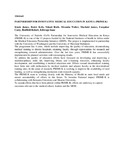| dc.contributor.author | Kiarie, J | |
| dc.contributor.author | Bosire, K | |
| dc.contributor.author | Nduati, R | |
| dc.contributor.author | Mwanda, W | |
| dc.contributor.author | Machoki, J | |
| dc.contributor.author | Farquhar, C | |
| dc.contributor.author | Redfield, R | |
| dc.contributor.author | Kibwage, IO | |
| dc.date.accessioned | 2013-12-04T15:38:57Z | |
| dc.date.available | 2013-12-04T15:38:57Z | |
| dc.date.issued | 2013-06 | |
| dc.identifier.citation | Kiarie James, Bosire Kefa, Nduati Ruth, Mwanda Walter, Machoki James, Farquhar Carey, Redfield Robert, Kibwage Isaac;June,2013.Partnership For Innovative Medical Education In Kenya (prime-k),presented at the 2nd International Scientific Conference, CHS And KNH, 19th - 21st June 2013. | en_US |
| dc.identifier.uri | http://hdl.handle.net/11295/61817 | |
| dc.description | Partnership For Innovative Medical Education In Kenya (prime-k),presented at the 2nd International Scientific Conference, CHS And KNH, 19th - 21st June 2013. | en_US |
| dc.description.abstract | The University of Nairobi (UoN) Partnership for Innovative Medical Education
in Kenya (PRIME-K) is one of the 13 projects funded by the National Institutes
of health in Africa under the Medical Education Partnership Initiative (MEPI).
The project is implemented in partnership with the University of Washington
and the University of Maryland Baltimore.
The programme has 4 aims, which include improving the quality of education,
decentralizing medical training to district hospitals, retaining faculty through
opportunities for research and strengthening research administration. Over the
last two years, PRIME-K has successfully implemented its planned activities
with encouraging results.
To address the quality of education efforts have focussed on developing and
improving a multidisciplinary skills lab, improving library and e-learning resources,
enhancing faculty development, and establishing a medical education unit. Efforts
toward decentralized training have been met with enthusiasm by medical students and
adjunct faculty at the decentralized training sites. In the areas of research, PRIME-K
is working to improve the availability of seed funding, as well as strengthening
institution-wide research capacity.
The PRIME-K team is working closely with the Ministry of Health to meet local
needs and ensure sustainability of efforts in the future. To broaden National impact
PRIME-K is collaborating with Kenyatta University and Maseno University.
To sustain efforts that have been piloted within PRIME-K, efforts are underway to
capture outcomes relevant to the medical school, funders and the MOH. | en_US |
| dc.language.iso | en | en_US |
| dc.publisher | University of Nairobi | en_US |
| dc.title | Partnership For Innovative Medical Education In Kenya (prime-k) | en_US |
| dc.type | Other | en_US |

